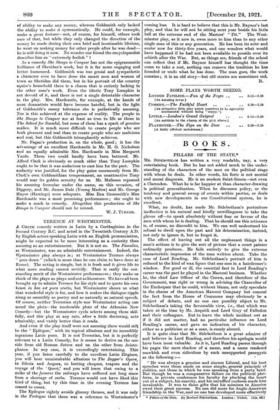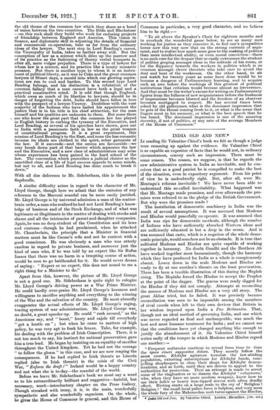BOOKS.
PILLARS OF THE STATE.*.
SIDEBOTIIAM has written a very readable, nay, a very entertaining book. But he has not added much to the under- standing of the characters of the men on the political stage with whom he deals. In other words, his forte is not mental and moral diagnosis. He is no modern Saint-Simon—not even a Clarendon. What he is far happier at than character-drawing is political generalization. When he discusses policy, or the tendency and general sweep of events within parties, or deals with new developments in our Constitutional system, he is excellent.
What, no doubt, has made Mr. Sidebotham's portraiture ineffective is his natural and kindly unwillingness to take the gloves off—to speak absolutely without fear or favour of the men with whom he is dealing. That he should use this reticence is, of course, no discredit to him. We can well understand his refusal to dwell upon the past and his determination, instead, not only to ignore it, but to forget it.
The effect of leaving out all the unpleasant things in a man's actions is to give the sort of picture that a- court painter ordinarily produces.. He fails entirely to give the extreme characteristic impression of the man written about. Take the case of Lord Reading. Mr. Sidebotham's portrait of him is reduced to the kind of wax figure that one sees in a hairdresser's window. For good or ill, the essential fact in Lord Reading's career was the part he played in the Marconi business. Whether he, the chief Law Officer of the Crown, and therefore of the Government, was right or wrong in advising the Chancellor of the Exchequer that he could, without blame, not only speculate in the shares of the American Marconi Company but conceal the fact from the House of Commons may obviously be a subject of debate, and no one can possibly object to Mr. Sidebotham's taking the favourable view, i.e., that which was taken at the time by Mr. Asquith and Lord Grey of Fallodon and their colleagues. But to leave the whole incident out as if it did not matter, had no particular influence on Lord
Reading's career, and gave no indication of his character, either as a politician or as a man, is surely absurd.
It is quite clear that Mr. Sidebotham is a great admirer of and believer in Lord Reading, and therefore his apologia would have been most valuable. As it is, Igrd Reading passes through his pages the mere shadow of a name, and a name rendered mawkish and even ridiculous by such unsupported panegyric as the following :-
" He was always a genuine and sincere Liberal, and his best speeches were those made on some simple, general principle of politics, not those in which he was speaking from a party brief. But though he was a comparative failure on the political plat- form, in private conference his faculty for plucking the heart out of a subject, his suavity, and his unruffled coolness made him invaluable. It was to these gifts that his missions to Ainerica owed their great success. No one did more for Anglo-American friendship in the War, and no one has developed more effectively • Pillars of the State. By Herbert Sidebothiun. London :" Nisbet. ' (12s. 64.] the old theme of the common law which they share as a bond of union between the two countries. The Bible and Blackstone —on this rock shall they build who work for enduring projects of friendship between England and America. This vision in finance, and diplomatic ill in adjusting the details of financial and commercial co-operation, take us far from the ordinary ideas of the lawyer. The next step in Lord Reading's career, the Viceroyalty of India, takes us farther away still. But the conception of law as a science which dries up the marrow and of its practice as the fashioning of thorny verbal bouquets is, after all, mere vulgar prejudice. There is a type of lawyer for whom law is a science, and its practice like a musty monastic penance. But there is another type to whom it is an instru- ment of political liberty, as it was to Coke and the great common lawyers of Stuart days, a mould into which our glowing aspira- tions are run to cool and harden. To this second typo Lord Reading belongs, and his distinction is a refutation of the common fallacy that a man cannot have both a legal and a practical constructive mind.- It is odd that though England, which owes so much of its liberties to lawyers, should be in danger of forgetting the debt, India should have fallen in love with the prpspect of a lawyer-Viceroy. Doubtless with the vast majority of the Indians who have hailed his appointment the justice that is in his title is his chief attraction, for the man himself and his qualities are unknown to them. But some there . are who know the great part that the common law has played in English history in curbing the tyranny of the Executive, and Lord Reading, as several of his speeches have shown, goes out to India with a passionate faith in law as the great weapon of constitutional progress. It is a great experiment, this mission of Lord Reading's to the East, and none the less romantic because its ideals are clothed in the quiet, sober garments of the law. If it succeeds—and the omens are favourable—we may break down part of that barrier which separates the law and the Executive, and a new class of administrators may arise whose experience has been gained in the hard school of the law. The convention which prescribes a judicial cloister as the sanctified close of a life of legal success appeals to some minds, but not to all, and Lord Reading has done much to break it down."
With all due deference to Mr. Sidebotham, this is the purest fiapdoodle.
A similar difficulty arises in regard to the character of Mr. Lloyd George, though here we admit that the omission of any reference to the Marconi scandal can be more easily justified. Mr. Lloyd George is by universal admission a man of the scatter- brain order, a man who realized he had not Lord Reading's know- ledge of business and of the Stock Exchange, and of what was legitimate or illegitimate in the matter of dealing with stocks and shares and all the intricacies of parent and daughter companies. Again, he was no deep student of the Constitution and its laws and customs—though he had proclaimed, when he attacked Mr. Chamberlain, the principle that a Minister in financial matters must be like Caesar's wife and not be content with a good conscience. He was obviously a man who was utterly careless in regard to private business, and moreover just the kind of man who, if he was told by an expert like Sir Rufus Isaacs that there was no harm in a tempting course of action, would be sure to go baldheaded for it. Re would never dream of saying : " Expert or no expert, this does not sound to me a right thing for a Minister to do."
Apart from this, however, the picture of Mr. Lloyd George is not a good one. Mr. Sidebotham is quite right to eulogize Mr. Lloyd George's driving power as a War Prime Minister. He could hardly over-praise Mr. Lloyd George's keenness and
willingness to sacrifice anything and everything to the winning of the War and the salvation of the country. He most absurdly exaggerates the actual effects of Mr. Lloyd George's raging, tearing system of war administration. Mr. Lloyd George was, no doubt, a great speeder-up. He could " rush around," as the Americans say, and " boost," hurry and cajole till everybody " got a hustle on " ; but when he came to matters of high policy, he was very apt to funk his fences. Take, for example, his dealing with the problem of Irish Conscription. There, it is not too much to say, his instinct for national preservation gave
him a true lead.. He began by insisting on an equality of sacrifice throughout the United Kingdom. Yet he had not the courage
" to follow the gleam " in this case, and we are now reaping the consequences. If he had replied to Irish threats as Lincoln replied (also to Irish threats) in the crisis of the Civil War, "Enforce the draft 1" Ireland would be a happy country and not what she is to-day—the scandal of the world.
Before we leave Mr. Sidebotham's book we must say a word as to his extraordinarily brilliant and suggestive—hateful, but necessary, word—introductory chapter on the Press Gallery, -Though streaked with irony, it is in the main, wonderfully sympathetic and also wonderfully sagacious. On the whole, he gives the House of Commons in general, and this Rouse of
Commons in particular, a very good character, and we believe him to be right: " To sit above the Speaker's Chair for eighteen months and to overlook the wonderful game below, to see so many men working for justice as they conceive it, to feel one's sympathies borne now this way now that on the strong currents of argu- ment, and to realize how much more goes to the making of politics than mere intellectual ability, or even moral conviction—there is no such cure for the despair that so easily overcomes the student of politics groping amongst ideas in the solitude of his room, or for the flippancy towas the workers in politics which is so common amongst clever theorists who take care to avoid the dust and heat of the workroom. On the other hand, to sit and watch for twenty years as some have done would be to become a dungeon of Parliamentary learning, and to acquire such an awe before the workings of this greatest of political institutions that criticism would become almost an irreverence. And that must be the writer's excuse for writing on Parliamentary figures from the fullness of new acquaintance before the freshness of impressions becomes blurred and the freedom of an observer becomes mortgaged to respect. He has several times been asked by old gallerymen what is the dominant impression that he gets of the House coming fresh to it, or what is the scene that lingers most in his memory, or what is the best speech that he has heard. The dominant impression is one of the amazing sincerity, if not of politics, at any rate of the average Members of the House of Commons."



































 Previous page
Previous page